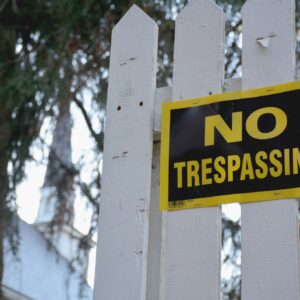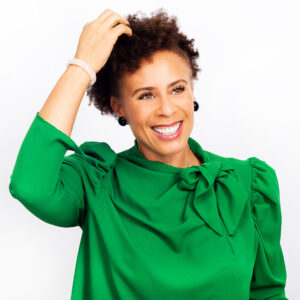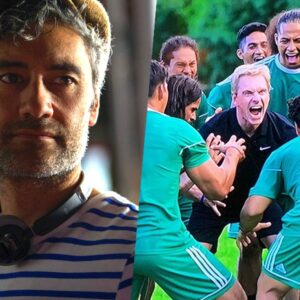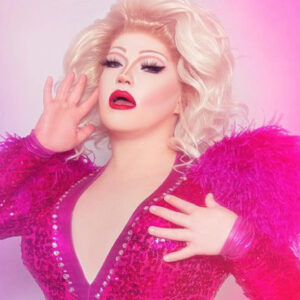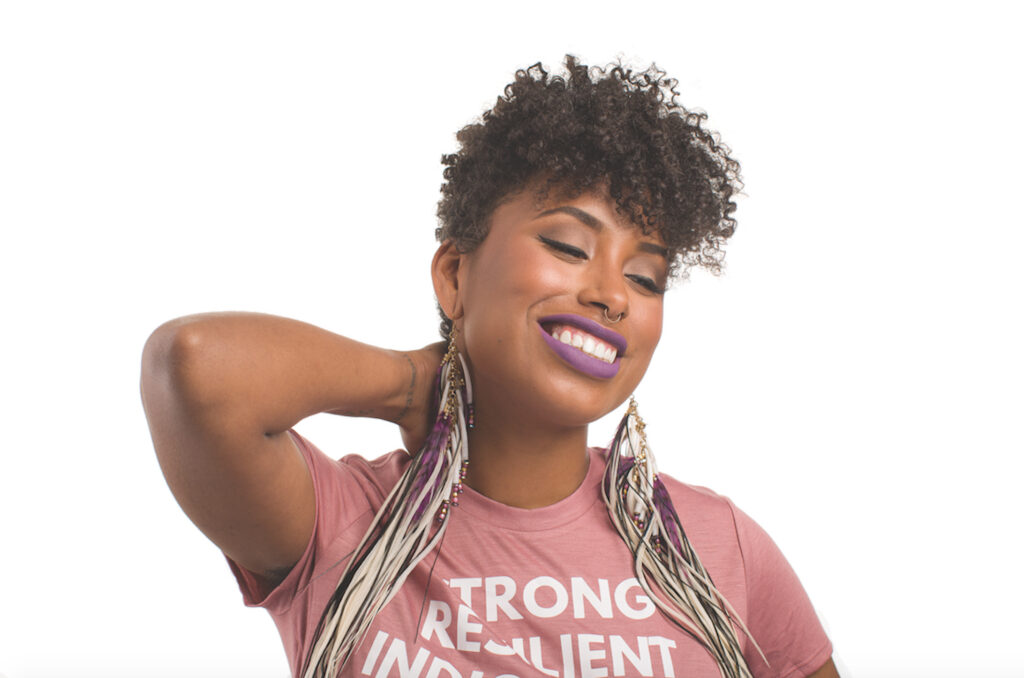
Keisha Erwin aka wapahkesis on TikTok is an Afro-Indigenous Nîhithaw (Woods Cree) band member of Lac La Ronge Indian Band, Treaty 6 territory in Saskatchewan. Keisha’s preferred pronouns are wītha, the gender-neutral third-person Cree term. Keisha has nearly 30,000 followers on TikTok and is on a journey of reconnecting and re-establishing connections with culture, family and language.
The Two Row Times caught up with Keisha in a Zoom call last week to talk about wītha’s platform and how to navigate intersectionality on social media.
TRT: What band and First Nation are you from? I am from Lac La Ronge Indian Band, Treaty 6 Territory in Saskatchewan. My father was part of the Sixties Scoop so I grew up very disconnected. My mom was born in Jamaica and came to what we now call Canada at the age of 17. I have always been a band member of Lac La Ronge Indian Band and a proud Woodland Cree.
TRT: What do you do for a living? I work for an Indigenous-led and run non-for-profit based out of Toronto. Also am a part-time artist and self-taught digital illustrator about to release my first kid’s book. It’s a Cree book that I illustrated myself. And I am also an emerging filmmaker.
TRT: Your TikTok lists your pronouns as they/them and one other. What is the third? Wītha. Is the gender-neutral third-person term in the Cree language. Cree doesn’t distinguish between he and she. I think it was not important to many Indigenous communities in the way that we’re used to. I also use wītha as it validates my Creeness.
TRT: How did TikTok find you? I first got an account at the beginning of the pandemic and I was living in Mississauga, Ont., at the time in a small townhouse. I was really bored. First I got on the app to view content and then I decided to post content as well. But it was at the beginning of the pandemic so I really just had nothing else to do.
TRT: What made you want to be a part of creating content? As someone who has multiple intersecting identities, I wanted to join a lot of conversations that were being had on TikTok. I wanted to bring a very critical lens to conversations around gender identity, transphobia, homophobia, anti-Blackness.
TRT: What is your platform in a few sentences? A lot of documenting me learning Cree language and unpacking privileges. I do talk politics on my account and controversial topics. Sometimes I showcase my art and beadwork. I post about beauty, Indigenous fashion and BIPOC-owned products. I have a lot of Indigenous-owned make-up products and Black-owned products I like to showcase.
TRT: Where did you grow up? I was born in Toronto but moved from there to Windsor, Ont., then Austria, then Texas, then finally back to Ontario when I was 17. I lived in North York while I was doing my undergrad but I moved to Saskatchewan three years ago to be closer to my community. I wasn’t raised close to my community at all so I am now 26 and actively trying to re-establish those relationships that were disrupted because of colonization and assimilation.
I feel like that’s important for disconnected Indigenous folk to learn our histories, to learn our families, to learn our languages, to revitalize those things and bring them into the future and our future generations. That’s something I’m really passionate about and that’s why I made the move to Saskatchewan. My goal is to become a Cree teacher when I become fluent.
TRT: What ways does where you grew up influence your content? I feel like where I grew up influences my content because disconnection has influenced my identity. Because I grew up so disconnected from my community a lot of my content is about re-establishing kinship connections and revitalizing things I didn’t have access to growing up. That’s also why I hope to inspire folks that have similar lived experiences of disconnection to me to learn our languages, to reconnect.
TRT: What ways does your family or chosen family influence your content? I feel like my lived experiences have influenced what I talk about especially when I’m talking about things like privilege. Both my paternal grandparents are residential school survivors and my cousins all grew up on reserve. My aunties and uncles all grew up on reserve. So I talk a lot about class privilege and having experienced relative class privilege growing up. I feel it has inspired me to really critique my own positions in this world and my own privileges.
TRT: What gap does your content fill in TikTok’s massive library of content? I feel like my content fills the gap of intersectionality. The gap of the lack of representation of Afro-Indigenous people. People who are both Native but also present as Black. And I feel as though I fill that gap. A lot of people have felt validated by the content I post and the opinions that I share. I try not to invalidate people and try to reiterate that as I’m having these conversations.
TRT: What is your goal on TikTok? When I first started I was addressing ignorance, especially within my own communities. I was calling folks out but now I feel like I have shifted directions. I feel like call-out culture is valid and people’s anger is valid and wanting to call people out is valid but that doesn’t allow for an engaging discussion. Or allow for people to have changed points of view. It doesn’t do anything besides create more division.
TRT: When you first started posting, what was your biggest insecurity you were worried about making public? Being on Native TikTok my biggest insecurities have always been around feeling invalidated growing up. As somebody who is obviously Black, having my identity and my Indigeneity invalidated. But at the end of the day, my family knows me. I’m status First Nations. My community knows me. I have relationship with them. It’s about me validating myself and my community validating my connection to them. That’s an insecurity of mine that’s often triggered on the app because people just see me one particular way.
TRT: How have you come to best describe what Two Spirit is? I’ve been identifying as non-binary for the past seven years. And I didn’t feel appropriate in claiming to be Two Spirit because I didn’t have teachings from my specific nation on what it meant to be Two Spirit. I didn’t have those teachings or understand the responsibilities of claiming to be Two Spirit because for me it’s much more than something you identify as and for a lot of Indigenous people it’s much more than that too. It’s beyond western conceptualizations. It’s taken me a long time to identify as Two Spirit. I identify as Two Spirit now because I’m actively trying to reclaim Two Spirit roles and responsibilities in my community.
TRT: Thinking of your first video that went viral, what emotion did you feel the most strongly? Some have a lot of views especially when it comes to the videos about Cree language and the emotion that I got was happiness. Speaking Cree on the app has inspired some to also pick up their language and I feel happy as if I’m doing something very positive for the community. Allowing folks to feel pride in their language.
TRT: What hurts the most when ignorant, sexist, racist, transphobic and other negative people interact with you online? I think it hurts the most when it’s people from my community who are saying these ignorant things. Especially when it comes to invalidating my identity based on how I present or misgendering me. I’ve been misgendered on Tiktok a lot but I feel like it hurt much more at the beginning. It’s up to me to validate myself. I know myself. I know my gender. I know my identity.
TRT: What sort of interaction with your followers brings you the most joy? People who are encouraged to learn their languages. That brings me a lot of joy. Also, people who share the same intersections that I share in terms of being both Black and Native and feeling validated. Them feeling validated with the content that I post. Them feeling less alone. That they’re seeing an authentic representation of Afro-Indigenous people.
TRT: What is the best piece of advice you could give a new content creator? Find your niche and find your community and not allow strangers and trolls to deter you from your goals and what you want to do online. Also, be teachable. Don’t come off like your opinions are the only opinions in the world. Try to have these conversations in the best way possible and to learn from other people’s perspectives as well.
Follow Keisha on TikTok @wapahkesis


